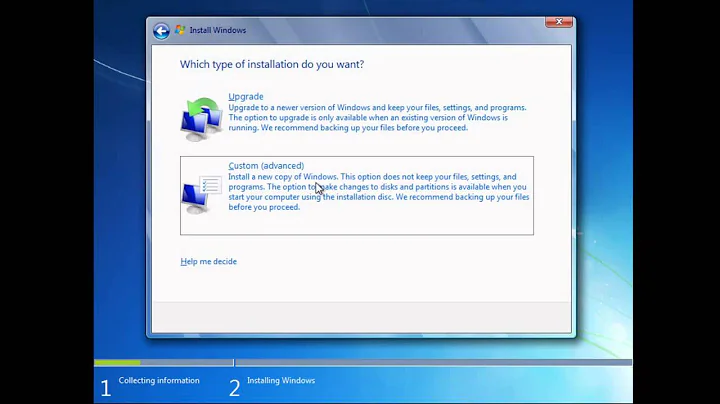Downgrading Windows 8 to Windows 7 - why 6 partitions?
Solution 1
Most of the 6 partitions are OEM partitions (recovery image). The error occurs, because you haven't booted Win7 in UEFI mode.
You should create a complete backup of your current HDD, use a partition tool, remove all partitions and let the Win7 setup create the partitions, it needs, again.
Solution 2
Here's what you can do, as I've done it hundreds of times so far.
The following steps will clean off all the partitions on the hard drive, and the configuration. You then convert it to MBR format so it uses partitions instead of volumes. You need to do this before the screen asking where to install comes up. If you don't want to lose your data, take a backup first.
- Start the Windows 7 Setup. Choose your language and click Next.
- Click Install Now
- While waiting, press Shift+F10 to bring up the Command Prompt.
- Type
diskpartand press Enter - Type
SELECT DISK 0and press Enter - Type
CLEANand press Enter. - Type
CONVERT MBRand press Enter - Type
Exitand press Enter - Close the Command Prompt and continue on.
NOTE: This will work for the OP only! For other users, when you get to Step 5, type LIST DISK and press Enter first! Select your hard drive from the list before you continue on to number 6!
Related videos on Youtube
mowwwalker
Updated on September 18, 2022Comments
-
mowwwalker over 1 year
I bought a computer with Windows 8 and have decided to downgrade to Windows 7. Asus has all the drivers for the model available online, so that shouldn't be a problem.
When I boot into the installation disk and choose to install Windows, it says I'm unable to install on any of the partitions. For all, one of the reasons is that they are GPT and Windows needs to be installed on a disk setup as MBR, using the NTFS file system. For some of the others, it says that one of the reasons Windows cannot be installed on the partition is because it is reserved.
I see the following partitions:
Disk 0 Partition 1: SYSTEM, type: System Disk 0 Partition 2: Recovery, type: OEM (Reserved) Disk 0 Partition 3, type: MSR (Reserved) Disk 0 Partition 4: OS, type: Primary Disk 0 Partition 5: Data, type: Primary Disk 0 Partition 6: Restore, type: OEM (Reserved)Is there a reason not to format the drive and just create two primary partitions? Is this even necessary?
-
mowwwalker about 11 yearsOK, that's all I wanted to know - if there's any reason to keep the partitions. I've booted into the Windows 7 installation disk and have the option to format the drive there. Is there a reason to use a partition tool instead of just formatting there?
-
Kevin Fegan about 11 years@Walkerneo - A partition tool may give you more flexibility in the number and size of the partitions you may want to create. Otherwise, you can let Windows Setup create the partition and then use a tool to resize/repartition later. I don't think it matters.
-
mowwwalker about 11 yearsAgh, the "format" option wasn't really a format option, it was a "erase contents of partition" option. Now my old Win8 is gone and I can't install Win7 -.- I'm going to try the gparted live cd. Wish me luck
-
Karan about 11 years@Walkerneo: Format only affects a single partition. To clean the disk use diskpart from the command line on the Win7 DVD, or just delete all existing partitions using the GUI. GParted will do the trick too of course. Also be sure to disable Secure Boot from the UEFI settings.
-
 magicandre1981 about 11 years@Walkerneo that's why I wrote make a complete backup of your Windows 8 so that you can always go back to Win8 if something goes wrong.
magicandre1981 about 11 years@Walkerneo that's why I wrote make a complete backup of your Windows 8 so that you can always go back to Win8 if something goes wrong. -
Ramhound almost 8 yearsThe fact the author has 6 partitions means that enabling legacy mode would conflict with his GPT partitions. There is no reason to enable legacy mode, it will NOT, solve the author's problem
![[LIVE] How To Downgrade If Windows 10 Doesn't Give You The Option](https://i.ytimg.com/vi/PHkUerwJzLk/hq720.jpg?sqp=-oaymwEcCNAFEJQDSFXyq4qpAw4IARUAAIhCGAFwAcABBg==&rs=AOn4CLDvIdQPBR7x4EKOGPgW87r-Qo-lUA)



